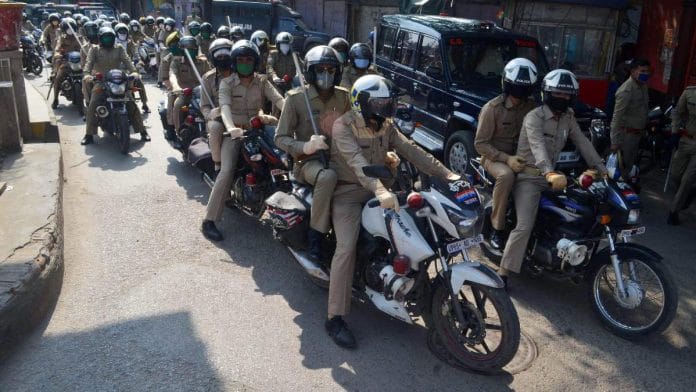It is well known that the country’s most populous state has had a major say in the national politics of the day. With eighty-five seats in the Lok Sabha, the lower house of the Indian Parliament, Uttar Pradesh has a significant contribution in the formation of the central government and the alignment of political forces of the country. For this reason, the party holding the reins of power in Lucknow enjoys an advantage over other parties.
During the election in 1993, the principal opposition party at the Centre, the Bharatiya Janata Party (BJP), was eyeing the UP throne. The BJP government in UP had been dismissed following the demolition of the Babri Masjid. The first major elections post the demolition would define conclusively the potential of the Ram Mandir issue to change the course of national politics. With these stakes, the election was being closely watched by political observers around the world, who had an interest in India’s attempt at secularism.
It was in the middle of feverish meetings and deliberations on the arrangements for the elections when the hotline drew my attention with its shrill caller sound.
‘Jai Hind, sir! This is the Reserve Inspector. There is trouble here in the Police Lines.4 The men have gone berserk and there is arson and disorder all around…A body was recovered from a drain. It was the body of a constable. They think he’s been dead for at least three or four days. His nameplate was smashed but we could see that the name had Ram in the middle…he appears to be Bhola Ram Yadav, who has been missing for a few days. The police station recorded his absence only this morning.’
I called the Station House Officer (SHO) of Chaman Ganj police station, where Bhola Ram Yadav was posted, to find out more. He told me that the constable had been patrolling the Saeedabad Road and later the Fatima Masjid area. He was accompanied by home guard Jata Shankar. He informed us that Yadav had allowed him to go back home because he had been running a temperature. On being asked where he had last seen Yadav, he said that they’d had their last meal at the Aftab Biryani Centre on Saeedabad Road four days earlier.
The SHO suspected the involvement of some gang in the Chaman Ganj area. Yadav was one of the few policemen who’d had the courage to go into the interior areas that were dominated by the most notorious criminal gangs. He must have accosted some gangster there. I was also told that the men posted in the police station were extremely agitated, demanding an armed raid in the area to frighten the criminals.
Also read: Almost 2 months since Amritsar ‘sacrilege’ lynching, police yet to identify killers or victim
The hotline was ringing again. It was the RI once more: ‘The SSP had come here on your orders, and the SP City was here too. Unfortunately, the Peshkar (Reader) of the SP City made a remark about policemen dying on duty all the time.
Tempers were already high, and this made the jawans violent. They ran after the Reader, and the SP City himself came in to protect him. The jawans then attacked the SP City, who ran away by climbing the gate that leads to the jail. Someone set the petrol pump here on fire. One of the trucks that was lined up there for diesel collided with an electric pole when the driver panicked. The damage to the pole caused a disruption in the power supply, and the area was plunged in darkness.’ I asked him where the SSP was. He hadn’t seen him.
Someone shouted, ‘Where is the SSP? Call him here. Call the SP City and his Peshkar. They deserve to be punished for their inaction and remarks.’ I looked at the RI, who was standing next to me. He told me that the SSP was in the armoury. I found it strange that the SSP was hiding in the armoury when Police Lines was literally on fire. I urged the
RI to summon the SSP immediately. A little later, he came back to inform me that the SSP had left. I was shocked at the desertion.
‘Sir, we will not go for any other duty till the murderers are apprehended.’ I was taken aback. The elections were a huge responsibility. Any agitation amongst the rank and file in Kanpur was bound to have repercussions elsewhere. The whole election would be in jeopardy if this snowballed.
When I told the DGP about the incident, he asked me where the SSP was. I told him the truth and he did not ask anything further. He told me to ask the District Magistrate to requisition the army to disarm the policemen and control the situation in the Police Lines. I responded, ‘Sir, their election duties begin tomorrow. If we call the army and disarm our men, we will have to face serious repercussions and the agitation might spread to other districts. The only suitable course of action is to have faith in our boys, and deal with the situation sensitively.’
It seemed to me that he did not approve of the choice I had made. He told me that an Additional Director General (ADG) would be in Kanpur the following morning to oversee the arrangements for the elections. I insisted that this was not necessary and that I had the confidence to manage the situation at our level. The DGP decided to ignore my recommendation and an ADG was sent to Kanpur from Lucknow. This demonstrated his lack of confidence in the Inspector General of the Zone, the DIG of the Range and the SSP of the district.
Also read: New election, old rivalry: Jailed Azam Khan & son make it ‘people vs nawabs’ in Rampur & Suar
Throughout the night, the CO entrusted with the investigation gave me updates on the progress that he and his team were making. By about 4 am, two suspects, Mohammad Imran and Atiq Mohammad, had been brought to the police station. I was worried that the police might lynch them. I had them shifted to another district of the Range for interrogation.
The fact that two suspects were being questioned calmed the men somewhat. By daybreak, the body of the slain constable had been brought back after the post-mortem examination. We observed the deeply emotional ritual of paying our last tribute at the cremation site on the banks of the Ganga. All this went through without any trouble. The mood in the rank and file was sombre, but a sense of duty towards ensuring peaceful elections also prevailed.
It was late in the evening when the last of the polling parties left. It was a big relief. For any administration, the days of poll-related activities are highly tense. A successful effort is a matter of relief and well-earned pride.
The ADG who was asked to oversee the elections was in Kanpur during the entire process. He hardly felt the need to move out of the Circuit House, where he was staying. When I went to see him off as he was leaving, he said, ‘Aloke, the arrangements made by you were perfect.’
I informed the DGP about this success. He was anything but generous in his response: ‘Wasn’t it a good idea to send an ADG to guide you?’
 This excerpt from ‘Murder in the Bylanes’ by Aloke Lal and Maanas Lal has been published with permission from Bloomsbury.
This excerpt from ‘Murder in the Bylanes’ by Aloke Lal and Maanas Lal has been published with permission from Bloomsbury.






